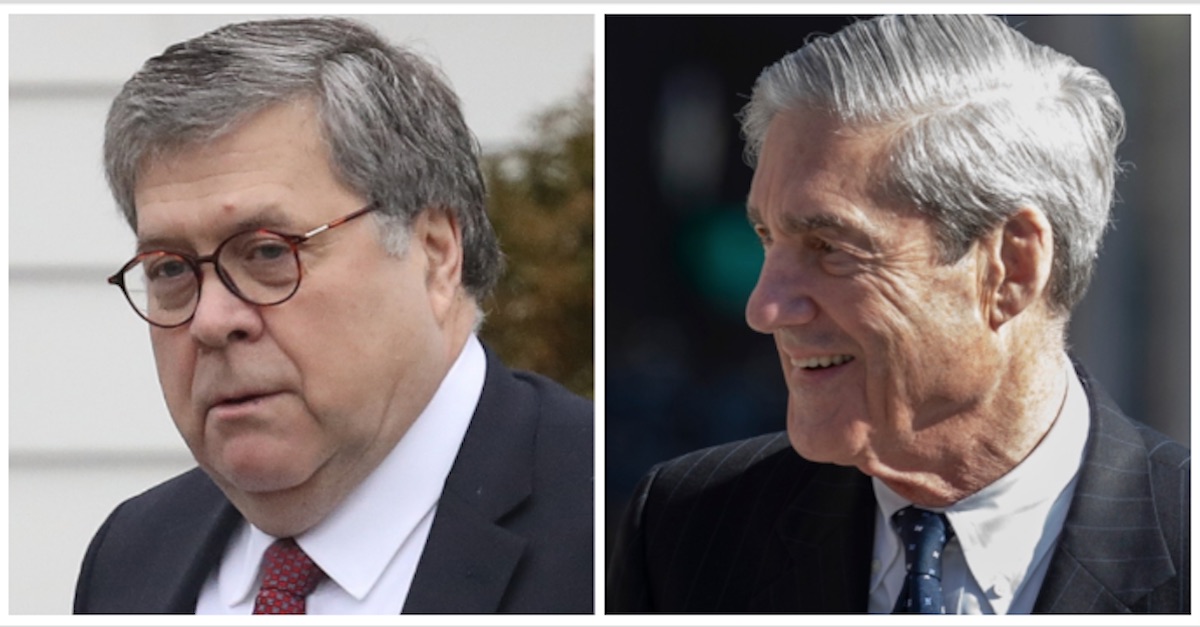
The Department of Justice sent former Special Counsel Robert Mueller a letter ahead of his scheduled Wednesday morning testimony before Congress, reminding him of what he “must” and must not say. Needless to say, this letter, which we will summarize below, evoked a bundle of opinions from legal experts. But first, the context.
Associate Deputy Attorney General Bradley Weinsheimer responded on Monday to a July 10 Mueller letter “concerning the testimonial subpoenas” he received from Congress (the letter apparently requested DOJ “guidance concerning privilege”). Weinsheimer alluded to Mueller’s only public statement about his report, in which Mueller said that his report was his testimony and that he wouldn’t be telling Congress anything new; he agreed that Mueller should not “go beyond” the public version of his report.
From there, the DOJ said Mueller should not testify about redacted portions of the report or grand jury information. The DOJ also mentioned: the Roger Stone and Russian troll farm cases are pending, so Mueller’s testimony about these matters will be “substantially restrict[ed]” by court order; the DOJ has longstanding policy not to discuss uncharged third-parties.
But it’s the last part of Weinsheimer’s letter that has elicited the loudest response:
Finally, any testimony must remain within the boundaries of your public report because matters within the scope of your investigation were covered by executive privilege, including information protected by law enforcement, deliberative process, attorney work product, and presidential communications privileges. These privileges would include discussion about investigative steps or decisions made during your investigation not otherwise described in the public version of your report. Consistent with standard practice, Department witnesses should decline to address potentially privileged matters, thus affording the Department the full importunity at a later date to consider particular questions and possible accommodations that may fulfill the committees’ legitimate need for information while protecting Executive Branch confidentiality interests.
CNN legal analyst and attorney Ross Garber told Law&Crime it is true that “Executive privilege considerations outlast a public official’s government tenure” and that “Mueller must still abide by grand jury secrecy rules.”
“As to the rest, DOJ seems to be reiterating the constraints of regulations applicable to the special counsel and well established prosecutorial norms, neither of which evaporate when a law enforcement official leaves public service,” he said.
National security lawyer Bradley P. Moss, for his part, commented that “As a matter of law, DOJ cannot mandate Mueller limit his testimony for anything aside from classified information. The courts have made this clear over and over regarding former employees.”
“Now, there likely are ethical reasons why Mueller will not release unclassified information redacted from the report as implicating executive privilege,” he added. “And there is a narrow grand jury information exception that has its own legal basis. But that’s it.”
What About Barr?
Much of the conversation about the letter focused on how U.S. Attorney General William Barr has handled the Mueller Report. Former acting Solicitor General Neal Katyal, who served during the Obama Administration, led the charge in this area, opining that the DOJ is trying to “dictate what Mueller can talk about, claiming anything not in public report is privileged.”
“But as I just wrote in @nytimes, Barr himself has said–since Mueller turned in report–Mueller could say if Trump committed crimes,” he continued. “The letter isn’t even signed by a high ranking DOJ official, and it certainly doesn’t take back what Barr said Mueller was able to do. DOJ now appears scared and resorting to their old playbook. Given their prior gross distortions of what Mueller found, hard to give credence here.”
Katyal went on to call the letter’s tone “bizarrely adversarial” and “not a way to treat a former FBI Director.” (Katyal wrote the special counsel rules.)
Former Obama Administration DOJ spokesman Matthew Miller said that Mueller is being told to play by rules Barr himself didn’t follow.
“One striking thing about DOJ’s letter to Mueller is how Barr has ignored the same guardrails in his discussions of the probe. DOJ’s position is it’s ok for Barr to talk about decisionmaking, findings that go beyond the report, etc. but Mueller can’t,” Miller said.
Speaking of Barr… the letter didn’t speak of Barr. Executive Director of the Institute for Constitutional Advocacy and Protection and Visiting Professor of Law at Georgetown University Law Center Joshua Geltzer noted that lawmakers might as well ask about Barr and Mueller’s conversations, since there was no “specific claim that Mueller’s interactions w/Barr are privileged.”
“Understanding how Barr distorted Mueller’s work is vital,” he said.
Now for some other questions.
Is Mueller a “rule follower” or will he surprise some people on Wednesday?
Can Mueller ignore the DOJ? House Judiciary Committee Chairman Rep. Jerrold Nadler (D-N.Y.) is telling him he can (“He doesn’t work for them.”)
What was in Mueller’s July 10 letter asking for guidance? We haven’t seen it.
Is the DOJ letter designed to give Mueller a way to avoid answering questions?
You can read the DOJ letter to Mueller in full below:
419414703-Mueller-Letter-07… by Beth Baumann on Scribd
[Images via Win McNamee/Getty Images, Tasos Katopodis/Getty Images]